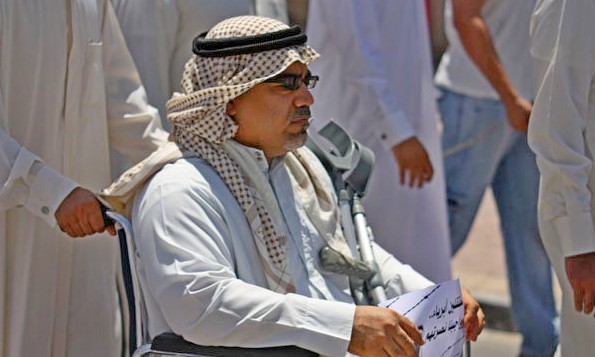UPDATE 7/5/2016: ADHRB has received reports that Dr. al-Singace has since been able to contact his family. It remains unclear if his health has improved.
Americans for Democracy & Human Rights in Bahrain (ADHRB) has learned that communication has been severed between Bahraini prisoner of conscience Dr. Abduljalil al-Singace and his family. For the last week, Dr. al-Singace’s family has not received contact from him or other jailed relatives that the government is currently holding at Jau Prison. ADHRB has been informed that authorities regularly deny inmates access to outside communication and have instituted new restrictive procedures on phone calls to families.
A credible source also informed ADHRB of Dr. al-Singace’s deteriorating health condition. The last time he was seen, his skin was pale and his hands were yellow. Blood tests have indicated that Dr. al-Singace – who suffers from post-polio syndrome, among other ailments – has a decreased number of white blood cells. The latest test revealed a white blood cell count of 3,700; for adults, anything below 4,000 is considered atypical and a potential health concern. In addition, Dr. al-Singace’s potassium level has reached 6.8. For adults, healthy levels average around 3.6 to 5.2 millimoles per liter, and any level higher than 7.0 requires immediate medical intervention.
For the past month and in violation of international law, Bahraini prison officials have prevented Dr. al-Singace from obtaining medical care that was deemed urgent. The authorities also denied his request for rubber pads that are needed for his crutches, as well as appropriate medical grips, also known as joint holders. Additionally, Bahraini officials have yet to administer Dr. al-Singace the medication needed to regulate and stabilize his fluctuating white blood cell and potassium levels.
In 2011, a Bahraini court sentenced Dr. Abduljalil al-Singace to life in prison on charges of attempting to overthrow the government, which were entirely related to his peaceful human rights and political activism. As a member of the Bahrain Academic Society, the Human Rights Bureau, and the Haq Movement for Liberty and Democracy, Dr. al-Singace was a prominent figure in Bahrain’s pro-democracy movement. A human rights defender and a member of the group of imprisoned pro-democracy leaders known as the Bahrain 13, Dr. al-Singace advocated for political reforms and improved living conditions for all Bahrainis.
Since March 2013, Bahraini officials have habitually ignored Dr. al-Singace’s requests for medical attention despite his long-term poliomyelitis, which has left him paralyzed since childhood. Bahraini officers beat and sexually abused Dr. al-Singace during his detainment. Officials forced al-Singace to stand on one foot and sign a coerced confession. On 28 January 2016, Dr. al-Singace ended a 313 daylong liquid-only hunger strike, which protested ill treatment and abuse in Jau Prison.
ADHRB calls on the Bahraini government to immediately adhere to international law and grant Dr. al-Singace adequate medical attention. The authorities’ evident negligence to provide Dr. al-Singace with necessary medication poses an imminent threat to his health. In addition, we urge the Bahraini government to cease the systematic harassment of Dr. al-Singace and all other political prisoners.
Reim Alian is an Advocacy Intern at ADHRB.





